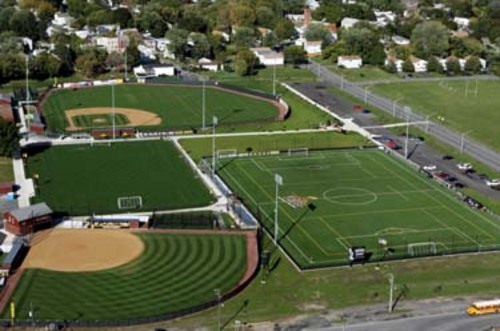 Christian Plumeri Sports Complex
The Christian Plumeri Sports Complex provides a first-class facility for the College's outdoor athletic programs and endows Albany's Hoffman Park with top-quality fields for community sports.
Christian Plumeri Sports Complex
The Christian Plumeri Sports Complex provides a first-class facility for the College's outdoor athletic programs and endows Albany's Hoffman Park with top-quality fields for community sports.
Completed in Spring 2010, the Complex is the new home of the outstanding Golden Knights baseball, softball and soccer teams and several of the College’s recreational and intramural sports programs. The College of Saint Rose is developing an intercollegiate men's lacrosse program throughout the next two years. The fields are also available to the community for summer recreational leagues, high school games, charity games and summer sports camps.
The new sports center is named for the late son of global business leader Joseph J. Plumeri. In August 2008, Plumeri announced a $1 million challenge gift to Saint Rose to provide a first-class facility for the College’s outdoor athletic programs and provide Hoffman Park with top-quality fields for community sports.
Plumeri is chairman and chief executive officer of Willis Group Holdings Limited, the world’s oldest global insurance broker. His accomplishments have been reported in every major business publication, and he is a frequent speaker at professional forums. Prior to joining Willis, Plumeri enjoyed a 32-year career at Citigroup and its predecessor companies.
Naming
Plumeri’s love of baseball is reflected in his co-ownership of the Trenton Thunder, New Jersey’s Class AA affiliate of the New York Yankees. The team’s home stadium, Samuel J. Plumeri Field at Mercer County Waterfront Park, is named for Plumeri’s father. Plumeri jump-started the fundraising for the new Saint Rose sports complex at the College’s May 2006 commencement, when as commencement speaker he announced that he would donate $100,000 to spur development of a new baseball field to be named in honor of the late, beloved Saint Rose baseball coach and Albany High School teacher Bob Bellizzi.
Scope of Complex
Saint Rose entered into a 30-year lease agreement beginning in 2007 with the City of Albany
Cost—$4.7 million to create fields for baseball, soccer/lacrosse and softball, a practice field and supporting structures
Size of project area—14.7 acres
Aspects of the Complex
A natural turf baseball field that complies with NCAA and New York State Interscholastic standards
A multi-purpose synthetic turf field for soccer and lacrosse that complies with NCAA and New York State Interscholastic specifications
A skinned infield and natural turf softball field that meets NCAA and New York State Interscholastic standards
A natural turf practice field
Spectator seating with handicapped access
Energy-efficient lighting
Parking, including handicapped spaces
Scoreboards and a public address system
Structures for equipment storage
Water, electrical and telephone systems
Security and safety components
To conserve energy and other resources, this complex has:
A Musco field lighting system, the most energy-efficient system available, featuring remote timers that activate lighting only when needed
Low VOC (Volatile Organic Compounds) paint, which is less harmful to humans and the environment
Scheduling activities during daylight hours to conserve electricity, when possible
Synthetic turf made of recycled materials to conserve water
FSC lumber
Recycled steel, aluminum and rubber from tires to construct the synthetic turf field
Recycling containers are placed throughout the park to reduce waste
Water retention tanks to recycle storm water
Recycling of construction and other materials to minimize waste
A minimum of 50 trees were planted, which will reduce wind impact and provide shade for cooling
The use of organic fertilization and an Integrated Pest Management (IPM) program, an effective and environmentally sensitive approach used to manage pest damage by the most economical means and with the least possible hazard to people, property and the environment
Green Design
This project was designed and constructed to have a positive impact on the environment. It will help area wetlands through an innovative storm water management system, cutting back on electricity use with efficient day lighting strategies and recycling construction materials.
This project reduces the utilization of natural resources and environmental impact through strategies such as reusing existing site materials, using recycled and/or recyclable materials, employing low-impact construction techniques, building to conserve energy and water and use of locally produced products and materials. It also saved desirable trees by relocating them to onsite or offsite locations.
Smart Growth
Principles of smart growth are incorporated into this project. Hoffman Park had five athletic fields that were repurposed. The economic and social needs of the surrounding neighborhoods were considered and incorporated into the design elements. This Complex will stabilize home ownership and stimulate general business development. The College’s investment in Hoffman Park will be leveraged to accomplish its mission of engagement in the urban community while raising the livability of Albany.
|

|